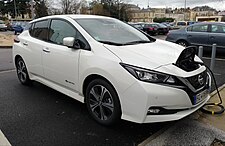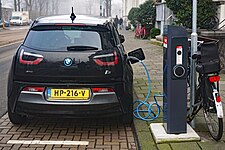
Electric car
Car propelled by an electric motor using energy stored in batteries / From Wikipedia, the free encyclopedia
Dear Wikiwand AI, let's keep it short by simply answering these key questions:
Can you list the top facts and stats about Electric car?
Summarize this article for a 10 year old
An electric car or electric vehicle (EV) is a passenger automobile that is propelled by an electric traction motor, using only energy stored in on-board batteries. Compared to conventional internal combustion engine (ICE) vehicles, electric cars are quieter, more responsive, have superior energy conversion efficiency and no exhaust emissions and lower overall vehicle emissions[1] (however the power plant supplying the electricity might generate its own emissions). The term "electric car" normally refers to plug-in electric vehicle, typically a battery electric vehicle (BEV), but broadly may also include plug-in hybrid electric vehicle (PHEV), range-extended electric vehicle (REEV) and fuel cell electric vehicle (FCEV).
The electric vehicle battery typically needs to be plugged into a mains electricity power supply for recharging in order to maximize the cruising range. Recharging an electric car can be done at a variety of charging stations; these charging stations can be installed in private homes, parking garages and public areas.[2] There are also research and development in other technologies such as battery swapping and inductive charging. As the recharging infrastructures (especially those with fast chargers) are still in its relative infancy, range anxiety and time cost are frequent psychological obstacles against electric cars during consumer purchasing decisions.
Worldwide, 10 million plug-in electric cars were sold in 2022, a total of 14% of new car sales,[3] up from 9% in 2021. Many countries have established government incentives for plug-in electric vehicles, tax credits, subsidies, and other non-monetary incentives while several countries have legislated to phase-out sales of fossil fuel cars,[4][5] to reduce air pollution and limit climate change.[6][7] EVs are expected to account for nearly one-fifth of global car sales in 2023, according to the International Energy Agency (IEA).[8]
China currently has the largest stock of electric vehicles in the world, with cumulative sales of 5.5 million units through December 2020,[9] although these figures also include heavy-duty commercial vehicles such as buses, garbage trucks and sanitation vehicles, and only accounts for vehicles manufactured in China.[10][11][12][13][14][15] In the United States and the European Union, as of 2020, the total cost of ownership of recent electric vehicles is cheaper than that of equivalent ICE cars, due to lower fueling and maintenance costs.[16][17]
In 2023 the Tesla Model Y became the world's best selling car.[18] The Tesla Model 3 became the world's all-time best-selling electric car in early 2020,[19] and in June 2021 became the first electric car to pass 1 million global sales.[20] Together with other emerging automotive technologies such as autonomous driving, connected vehicles and shared mobility, electric cars form a future mobility vision called Autonomous, Connected, Electric and Shared (ACES) Mobility.[21]
Oops something went wrong:





